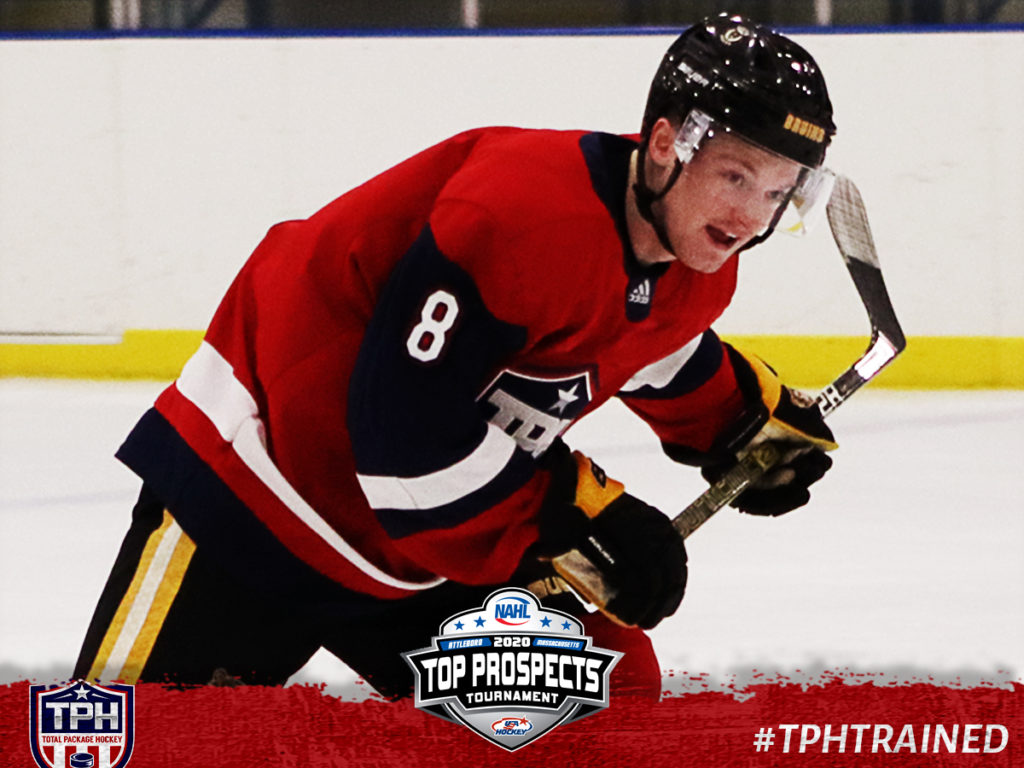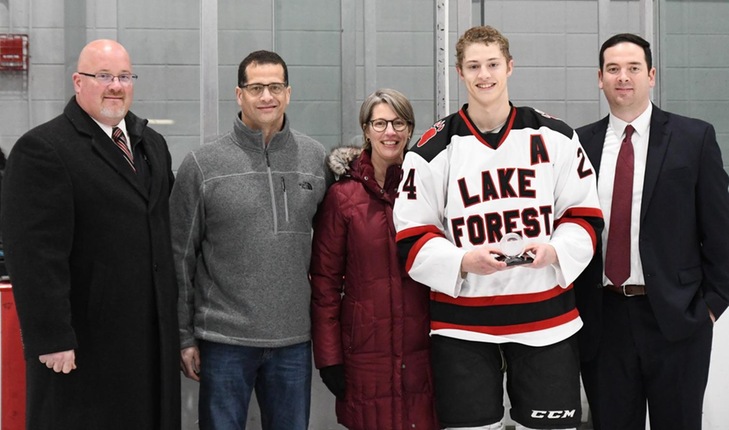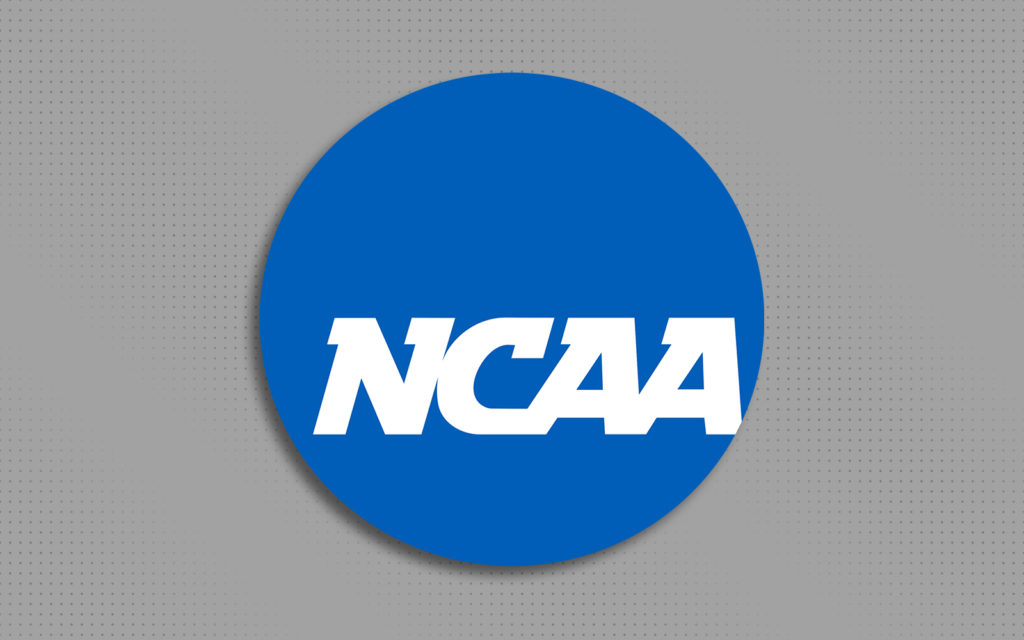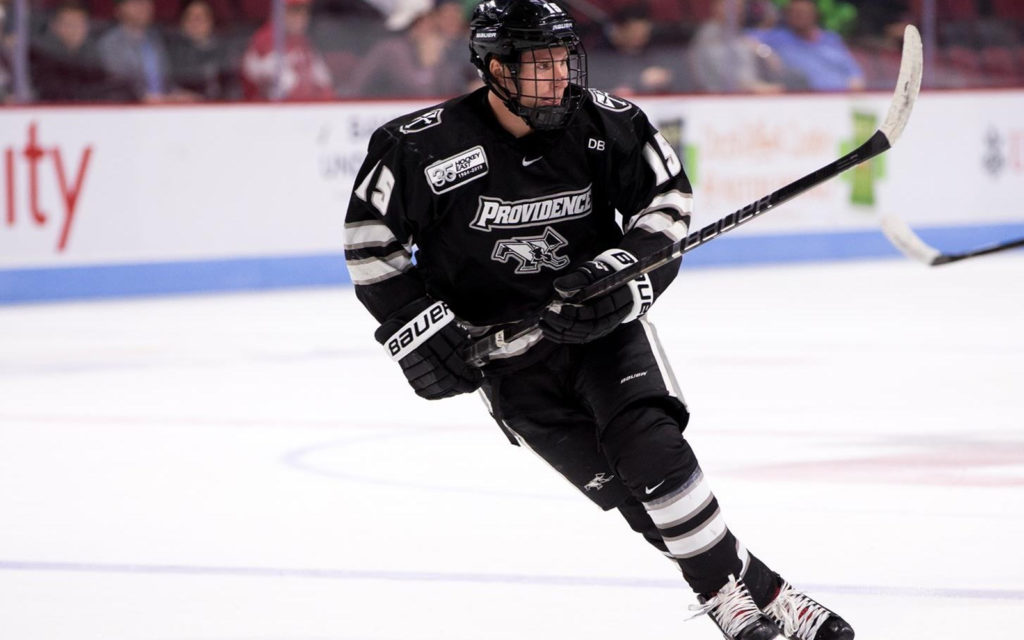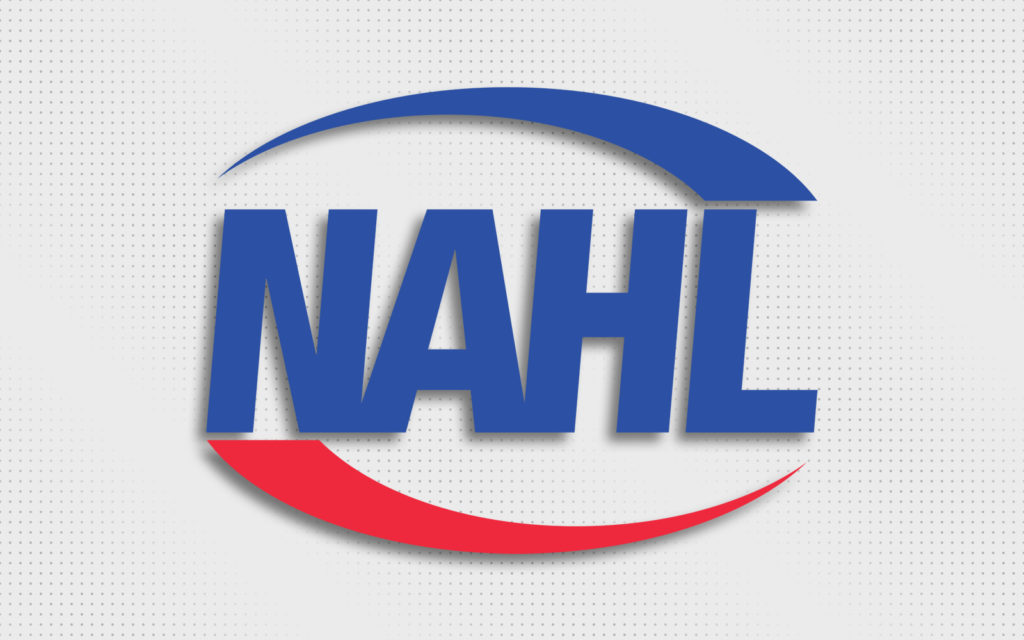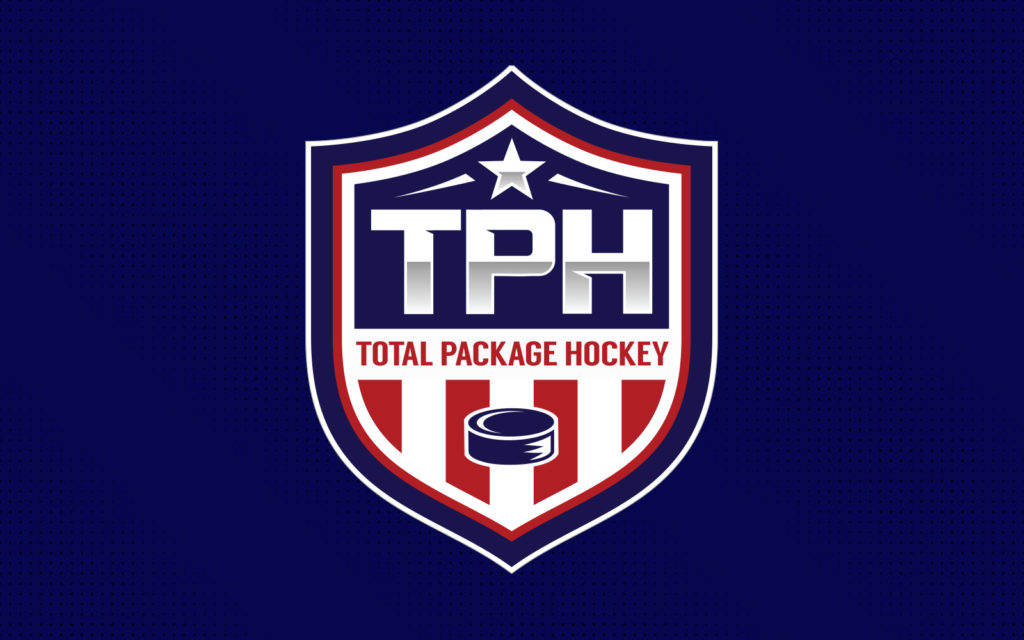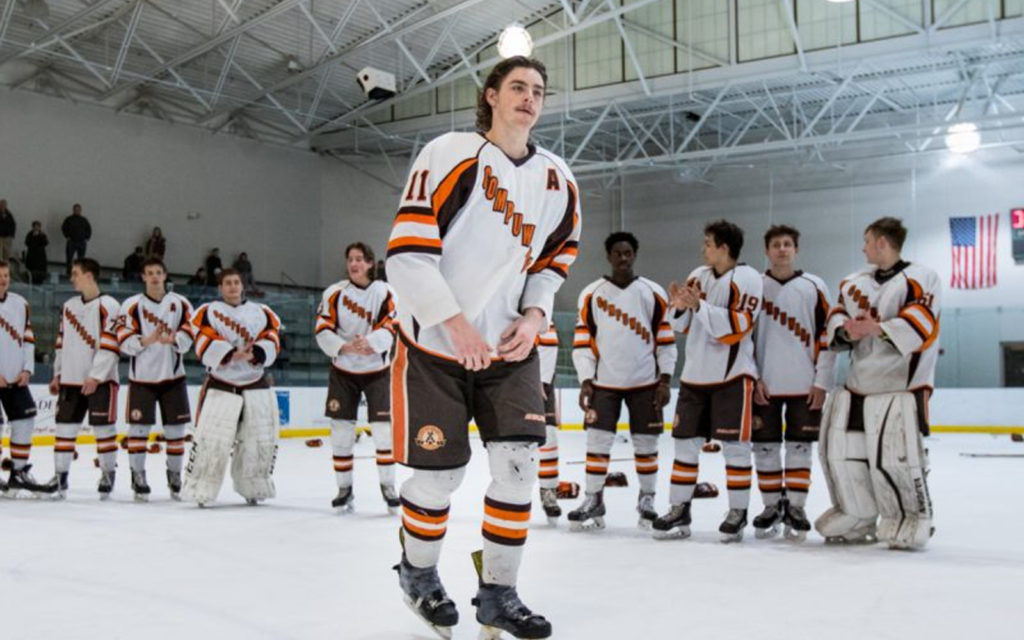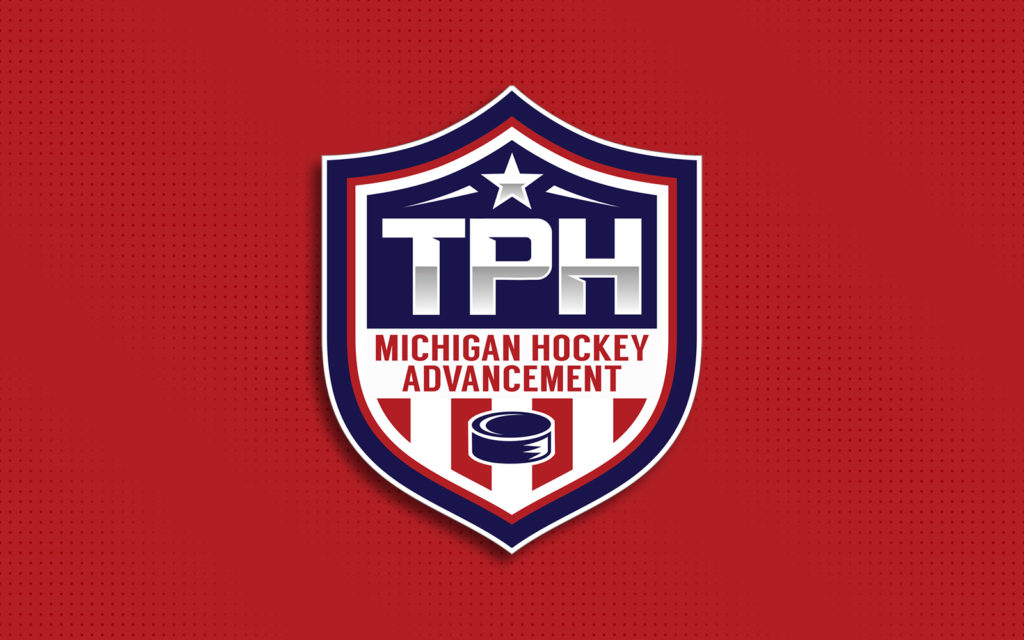Posts Tagged ‘Awards & Recognition’
Multiple #TPHTrained Athletes Named to 2020 NAHL Top Prospects Rosters
Central
Jed Pietila /// Michigan Hockey Advancement
East
Cannon Green /// 8 Week Program, Detroit CoE
South
Matt Hutton /// Nashville Jr Predators
Ryan Dickinson /// 8 Week Program, Detroit CoE, OHL Cup
Richie Parent /// Tri-State Spartans, Indy CoE
Nick Trela /// 8 Week Program
Selects Blue
Carson Riddle /// Detroit CoE, OHL Cup, World Selects Invite
Selects Blue
Tiernan Shoudy /// 8 Week Program
Selects Red
Samuel Brennan /// 8 Week Program, World Selects Invite
Grant Hindman /// 8 Week Program
About NAHL Top Prospects
2020 NAHL Top Prospects Tournament Schedule (all times eastern)
Monday, February 17th
Tuesday, February 18th
Aaron O’Neill was presented with the Peter Taylor Award
TPH alum Nathan Krusko earns ECAC Rookie of the Week honors
TPH Thunder alum and current Harvard forward Nathan Krusko was named ECAC Rookie of the Week last week.
Krusko, a freshman from Alpharetta, Ga., tallied his first career hat trick in a 5-2 win over Quinnipiac on Jan. 6. In 16 games with the Crimson this season, Krusko has five goals and two assists for seven points.
With the TPH Thunder, Krusko averaged nearly a point per game in his midget major season, tallying 34 points in 35 games in 2013-14. He played his junior hockey for the Minnesota Magicians (NAHL) and Omaha Lancers (USHL).
TPH alum Josh Wilkins named Hockey East Rookie of the Week
Congrats to TPH alum and Providence Friars forward Josh Wilkins, who was named Hockey East Rookie of the Week on Jan. 2.
From the Providence website:
“Providence College men’s hockey freshman Josh Wilkins (Raleigh, N.C.) was named Hockey East Rookie of the Week in an announcement made by the league on Monday (Jan. 2).
Wilkins put the Friars up 2-1 on the power play just 1:16 into the third period with the eventual game-winning goal in Providence’s 3-1 win over then No. 2 Denver on Saturday night and recorded a shot on goal in Friday’s 2-2 tie with the Pioneers. He also tallied a season-high eight shots on goal in the win for the Friars on Saturday. This season, Wilkins sits in a third place tie among Hockey East rookies with 15 points (6-9-15) and also ranks third with 53 shots on goal. Wilkins is the first Friar to earn Hockey East Rookie of the Week honors since Brian Pinho on Oct. 14, 2014.
The Friars currently hold a five-game unbeaten streak (3-0-2) and are 2-0-1 against Denver since the two teams met at the 2015 Northeast Regional Final at the Dunkin’ Donuts Center in Providence on March 29, 2015.
Wilkins and the Friars are back in action this Saturday (Jan. 7) at Frozen Fenway against No. 8 Boston College. Face-off is scheduled for 5 p.m. between the Friars and Eagles.”
TPH alum Nathan Krusko scores first collegiate goal with Harvard
Congrats to former TPH Thunder AAA star Nathan Krusko on scoring his first collegiate goal for Harvard!
Krusko’s goal helped Harvard take down Bentley, 5-2, on Nov. 26.
The Alpharetta, Ga., native spent four years with the TPH Thunder AAA program, tallying 88 points in 99 games. He also played for the Minnesota Magicians (NAHL) and the Omaha Lancers (USHL) before joining the Harvard hockey program.
TPH alum ’99 goaltender Erik Gordon earns NAHL Player of the Week honors
Congrats to TPH alum and current Lone Star Brahmas goaltender Erik Gordon on earning NAHL Player of the Week honors for the week of Oct. 31. From the NAHL:
“Thanks to three wins in Odessa this past week, the Lone Star Brahmas are not only leading the South Division, but statistically, now have the best winning percentage in the NAHL. Goalie Erik Gordon, 17, was between the pipes for two out of the three wins during the weekend and allowed just one goal on 51 shots, making 50 saves. That included a 25-save shutout on Saturday night for the 5’10/160 lbs. native of Duluth, Georgia. Gordon is a perfect 7-0-0 this season with a 1.51 goals against average and a 93.8% save percentage. “Erik was there to make the key saves. We had some breakdowns defensively this weekend and he made some big saves and stood tall when they had some quality opportunities. He was our rock back there this weekend and it was one of the big reasons we picked up three road wins against a very good Odessa team,” said Lone Star head coach Dan Wildfong.”
IIHF Hall of Fame names 20th induction class
The International Ice Hockey Federation’s Historical Committee has announced the 2017 induction class to the IIHF Hall of Fame.
Former players Saku Koivu, Uwe Krupp, Angela Ruggiero, Joe Sakic and Teemu Selanne, along with builder Dieter Kalt will be inducted to the IIHF Hall of Fame.
Former Great Britain national team player and coach Tony Hand has been selected to receive the Richard “Bibi” Torriani Award.
French ice hockey executive and former player and coach Patrick Francheterre will be given the Paul Loicq Award.
The 2017 IIHF Hall of Fame Induction Ceremony will take place in Cologne, Germany on 21 May, the final day of the 2017 IIHF Ice Hockey World Championship.
Click here for a complete list of all of the IIHF Hall of Fame’s honoured members.
Dieter Kalt
b. Klagenfurt, Austria, 29 July 1941
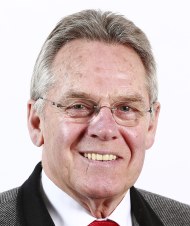 A star player during the 1960s in the Austrian league, Dieter Kalt has been the very face of Austrian hockey for half a century and more, first on the ice, and then in an executive capacity.
A star player during the 1960s in the Austrian league, Dieter Kalt has been the very face of Austrian hockey for half a century and more, first on the ice, and then in an executive capacity.
On the national stage, Kalt led Klagenfurt to championships in five seasons during a six-year period – 1966, 1967, 1970, 1971, and 1972. In all, he played for Klagenfurt from 1957 to 1967 and again from 1969 to 1980. He also played for Graz from 1967 to 1969 while finishing his law degree.
Internationally, Kalt first represented his country at the 1962 World Championship in Colorado Springs (B pool). He played in every major IIHF event from 1962 to 1972 except the 1963 Worlds and captained the WM team in 1969 and 1972. As well, he wore the “C” for Austria at the 1968 Olympics, his second.
After retiring, Kalt worked as a referee and later a coach. In 1976, he started working with the Austrian Ice Hockey Federation (OEHV) as a team leader in charge of sport development.
From 1996 to 2016, he was President of the Austrian Ice Hockey Federation, and, upon retiring in 2016, Kalt was named Honorary President by his federation. Kalt is also a long-time member of the Austrian Olympic Committee.
His son, Dieter Kalt, Jr., had an extraordinary career in his own right. Internationally, the younger Kalt played at 13 World Championships between 1993 and 2007 as well as three successive Olympics (1994, 1998, 2002).
Saku Koivu
b. Turku, Finland, 23 November 1974
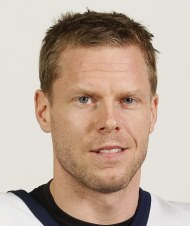 Perhaps the greatest competitor that Finnish ice hockey has ever produced, Saku Koivu was a player of skill, heart, dedication, and honour. In a career that lasted nearly two decades both internationally and in the NHL, Koivu captained his team to many great moments.
Perhaps the greatest competitor that Finnish ice hockey has ever produced, Saku Koivu was a player of skill, heart, dedication, and honour. In a career that lasted nearly two decades both internationally and in the NHL, Koivu captained his team to many great moments.
Although he was part of Suomi’s bronze medal at the 1994 Olympics, and a silver medallist a few months later at the World Championship, it was a year later that Koivu first achieved something historic.
Playing on a line with Jere Lehtinen and Ville Peltonen at the 1995 World Championship, the trio led Finland to its first ever gold medal at that event. All three players on the team’s top line were named to the All-Star Team, and Koivu was named IIHF Directorate Award Best Forward.
That fall, Koivu left Finnish league hockey to begin an historic career with the Montreal Canadiens. As a rookie he scored 20 goals and was a brilliant addition to the team, displaying great skating speed, soft hands with the puck, and great two-way play.
It was in 1998 at the first NHL-led Olympics that Koivu wore the “C” for the first time, and when Finland defeated Wayne Gretzky and Canada, 3-2, in the bronze-medal game, Koivu’s legend only increased.
In 1999, he was given the honour of wearing the “C” for the Canadiens, the first-ever European captain for the storied franchise. It was a letter that adorned his “chandail” for ten years. Only the great Jean Beliveau wore it as long in team history.
Koivu’s career was punctuated by injury, and each and every time he fought back to resume playing at the highest level. He suffered bad injuries to his knees and legs as well as an eye injury that has affected his vision to this day, but nothing was as traumatic as when he was diagnosed with non-Hodgkin’s lymphoma. He missed almost all of the 2001/02 season, including the 2002 Olympics, but as always he battled back and returned to a standing ovation.
Koivu’s participation in the World Championship was as faithful as any player of his era. His credo was simple – if I can play, I will. He took Finland to another gold-medal game in 1999, this time against the Czech Republic. The best-of-two format culminated with a sudden-death overtime, where Jan Hlavac’s goal forced Suomi to settle for a hard-fought silver.
In 2004, at the World Cup of Hockey, Koivu again wore the “C” and again took his team to the championship game, this time losing 3-2 to Canada. And in 2006, at the Turin Olympics, Finland capped another historic run to the finals before a narrow 2-1 loss to arch-rivals Sweden.
In all, Koivu participated in 11 top competitions for Finland, winning eight medals. In the NHL, he finished his career in Anaheim alongside Teemu Selanne before retiring in 2014. He played in some 1,124 regular-season games as well as 79 in the playoffs.
Never the biggest man on ice by height or weight, Koivu was a giant and legend in terms of skill, sportsmanship, and dedication. He battled through injuries and opponents with equal determination, and he achieved glory for his country as few players have in the game’s history.
Uwe Krupp
b. Cologne, West Germany (Germany), 24 June 1965
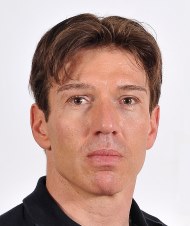 It’s difficult enough making an impact at the top levels of hockey, but it is doubly so for players outside the “Big Six,” because their chances of crafting an impressive resume through medals is greatly diminished.
It’s difficult enough making an impact at the top levels of hockey, but it is doubly so for players outside the “Big Six,” because their chances of crafting an impressive resume through medals is greatly diminished.
Yet it is easy to name Uwe Krupp as the finest hockey player Germany has ever produced. A defenceman of imposing size, he was nevertheless a fluid skater who brought the puck out of his zone with fluid consistency.
As a result, legendary coach Scotty Bowman wasn’t disappointed that Krupp failed to register a point at the 1983 World Junior Championship. And he wasn’t disappointed that Krupp’s offensive production with Kolner Haie was similarly low. Bowman saw behind the numbers, and while GM of the Buffalo Sabres selected Krupp 214th overall at the 1983 draft.
Krupp stayed in Germany for three more seasons, but in 1986, after a brief but impressive showing at the World Championship, he was ready to try his hand at the pro level in North America. Although he played several games with the Sabres that year he spent most of the 1986/87 season in Rochester where he helped the Americans win the Calder Cup. After that, Krupp was an NHLer for the next 14 seasons, making history for himself and for Germany.
At 198 cm (6’6”) tall, he was the tallest player in the league for several seasons, but, impressively, mobility was never his weakness. Krupp played for the Sabres for the better part of six seasons before being traded to the New York Islanders where he continued to develop his offensive skills.
It was at the 1994 draft that Krupp’s career took a turn that would change his life. He was traded to the Quebec Nordiques with a first-round draft choice for Ron Sutter and a first-rounder. Just one year later, the Nordiques, a Stanley Cup contender, moved from Quebec to Denver, Colorado. The team reached its zenith by advancing to the Cup finals against Florida, an expansion team making its first appearance in the finals.
The Avalanche won the first three games by scores of 3-1, 8-1, and 3-2, but game four was goalless through 60 minutes of regulation time. The fourth period and fifth period were also played without a goal, but at 4:31 of the sixth period Krupp scored to give the Avs the Cup and cement his own legacy. He was the first German to score a Cup-winning goal and the first German to win the Cup.
In addition to a brief appearance at the 1998 Olympics, Krupp was part of another Cup-winning team under Bowman, this time in Detroit in 2002. By this time back injuries had severely compromised his career, and he retired soon after.
Krupp later returned to Germany to coach the junior and senior teams, leading the national program from the 2006 Olympics through the 2011 World Championship. He started as a German pioneer in the NHL, made history during his career in North America, and returned home to teach a new generation of players what he had learned.
Angela Ruggiero
b. Panorama City, California, USA, 3 January 1980
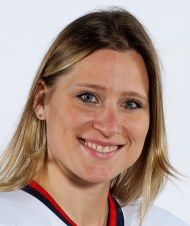 From the school room to the board room to the arena, no woman has commanded the respect and accomplished as much as Angela Marie Ruggiero. Playing hockey as a teenage girl in California was an unlikely starting point for someone who has reached such lofty heights, but Ruggiero always thought big and aimed higher.
From the school room to the board room to the arena, no woman has commanded the respect and accomplished as much as Angela Marie Ruggiero. Playing hockey as a teenage girl in California was an unlikely starting point for someone who has reached such lofty heights, but Ruggiero always thought big and aimed higher.
She made her debut with the U.S. National team as a 17-year-old at the 1997 Women’s World Championship in Kitchener, Ontario, and by the time she announced her retirement, on 28 December 2011, she had produced a career worthy of the Hall of Fame.
Unlike many female players of her era, Ruggiero was big and strong. As a defenceman she used those skills at both ends of the ice and became the cornerstone of the American blueline corps for more than a decade.
Without a doubt, her greatest thrill came early. The youngest player on Team USA at the 1998 Olympics – the inaugural event for women’s hockey – Ruggiero helped her team stun Canada in the gold-medal game.
As special as that moment was, though, she experienced frustration repeatedly at the Women’s Worlds, finishing runner-up time and again. But in 2005, the final game another Canada-United States showdown, it was Ruggiero’s goal in the penalty-shot shootout that proved the margin of victory, the first Women’s Worlds gold for the Americans.
Ruggiero went on to win three more World Championships, and her name was a virtually constant presence at every end-of-tournament all-star team or Directorate Award announcement.
By 2011, though, having accomplished all that she could on ice – and feeling the effects of injuries to her 31-year-old body – Ruggiero retired from the game. She was, however, only starting her career in sport administration.
Indeed, education was always more important to her than hockey. She attended Harvard University from 2000 to 2004 where she graduated cum laude with an undergrad degree in government while also being named the Patty Kazmaier Award winner in 2004 as the best female hockey player in the NCAA.
Ruggiero later earned a master’s degree in sports management from the University of Minnesota as well as an MBA from Harvard Business School. In 2010, Ruggiero was named to the evaluation commission for the 2018 Olympics, one of only eleven athletes who would inspect facilities for prospective hosts for those Olympic Winter Games.
This proved only a starting point for her involvement with the IOC at an executive level. In 2013, she was named to the IIHF Athletes’ Committee, and in 2016 she was promoted from Vice-Chair to Chair of the IOC’s Athletes’ Commission as well as being named to the executive board of the IOC.
She was inducted into the Hockey Hall of Fame in Toronto in 2015. A champion player on the ice, Ruggiero is proving to be equally successful off of it in the name of promoting and enhancing sport worldwide.
Joe Sakic
b. Burnaby, British Columbia, Canada, 7 July 1969
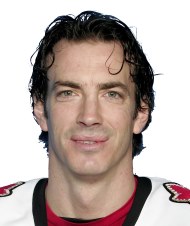 The 12th member of the IIHF’s Triple Gold Club, Joe Sakic was a winner from the beginning of his career to the end. A leader and gentleman, he also possessed the most effective wrist shot in the game and was admired and respected by teammates and opponents equally.
The 12th member of the IIHF’s Triple Gold Club, Joe Sakic was a winner from the beginning of his career to the end. A leader and gentleman, he also possessed the most effective wrist shot in the game and was admired and respected by teammates and opponents equally.
Sakic started his NHL career in 1988 after being drafted 15th overall by Quebec the previous year. The team had wanted him to play right away, but he insisted on taking another year in the WHL with Swift Current, during which time he helped Canada win gold at the 1988 World Junior Championship in Moscow. At season’s end, he was named the best junior player in Canada.
He quickly established himself as a powerful forward whose quick release made his shot so effective. He scored 23 goals as a rookie and a year later he eclipsed the 100-point plateau for the first of six times in his career.
What was also obvious to all who knew him was his quiet leadership abilities. Not a screamer by nature, he nonetheless inspired those around him to raise their level of play when it mattered most. Fiercely competitive yet even-tempered, he was a leader in the Steve Yzerman mold, and in 1992 Sakic was named captain of the Nordiques. He would wear the “C” for the next 17 years of the franchise’s history.
Sakic played in two World Championships early in his NHL career, winning silver in 1991 and gold three years later, the first for Canada since 1961. The Nordiques, however, moved to Colorado in 1995, and in the first season won the Stanley Cup. That was a career year for “Gentleman Joe,” who had 51 goals, 69 assists, and a career high 120 points. In the playoffs, he scored the winning goal in six of the team’s 16 wins and was named Conn Smythe Trophy winner.
The Avalanche won the Cup again in 2001, but it was a gesture by Sakic in celebration that remains in the mind’s eye. Instead of raising the Cup high over head, as is tradition for the Cup-winning captain to do, Sakic swooped the trophy low and handed it to Ray Bourque, the former Boston Bruins defenceman who had never been able to win the trophy with the Bruins in nearly two decades.
Sakic was also part of Canada’s historic 2002 Olympic team that won gold for the first time in half a century. He scored a pivotal goal in the gold-medal game and was named tournament MVP for his brilliant play in Salt Lake. He won the World Cup in 2004 with Canada and two years later captained his country at the Turin Olympics.
By the time he retired in 2009, Sakic had won everything there is to win. His NHL statistics were staggering: 1,378 games played, 625 goals, 1,106 assists. He had his number 19 retired by the Avs the year he retired and was inducted into the Hockey Hall of Fame in 2012.
Sportsman, victor, leader, Joe Sakic was one of the game’s legends.
Teemu Selanne
b. Helsinki, Finland, 3 July 1970
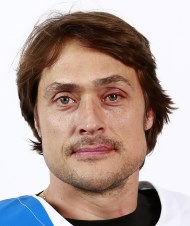 Gordie Howe is known as Mr. Hockey. Glenn Hall is called Mr. Goalie. It is only right, therefore, to refer to Teemu Selanne as Mr. Olympics, for no hockey player has ever appeared in the Olympic Winter Games as many times as the six appearances by arguably the greatest hockey player ever to come out of Finland.
Gordie Howe is known as Mr. Hockey. Glenn Hall is called Mr. Goalie. It is only right, therefore, to refer to Teemu Selanne as Mr. Olympics, for no hockey player has ever appeared in the Olympic Winter Games as many times as the six appearances by arguably the greatest hockey player ever to come out of Finland.
Although he was drafted by the Winnipeg Jets in 1988, fans had to wait four years before he made his NHL debut. In the interim, he played at every top international tournament possible, from the World Juniors in 1989 in Alaska, to the 1991 World Championship, 1991 Canada Cup, and 1992 Olympics in Albertville, where the 21-year-old tied for the goal-scoring lead with seven.
Making his NHL debut in October 1992 as a 22-year-old, Selanne played with a maturity far beyond any other first year player. By the time the season was over he had scored a staggering 76 goals and 132 points, both records for a rookie and which might never be broken. He was, of course, awarded the Calder Trophy, and although he never reached those lofty heights again he did establish a level of consistently high play that made him an elite player.
Selanne was called the “Finnish Flash” because of his breakaway speed, but he had a fantastic shot as well. Once he created an opening with his skating, he was more than able to finish the play with a wicked blast.
Despite his status, though, the Jets traded him to Anaheim in a deal that brought young players Chad Kilger and Oleg Tverdovski to the Jets. It was a deal Winnipeg fans had a tough time accepting, and an inspired Selanne responded with consecutive 50-goal seasons with the Ducks.
Selanne played in his second Olympics in 1998 when Finland beat Canada to win the bronze medal. A year later, the Finns lost in overtime to miss out on a World Championship gold medal, settling for silver.
Like all superstars, Selanne was not only highly skilled – he was incredibly consistent at this high level. He scored 684 goals in 21 NHL seasons, three times surpassing 50 in a season. In 1998/99, he won the “Rocket” Richard Trophy with 47 goals, tops in the league. In all, he recorded 1,457 total points in 1,451 regular-season games.
Despite the numbers and personal success, though, his greatest memory of NHL play was the 2006/07 season when he helped the Ducks to their first, and only, Stanley Cup.
Ultimately, though, it was his storied career with Suomi that fans remember. Selanne donned the blue and white one last time, in Sochi in 2014 at age 43. There he played so well while leading the Finns to a bronze medal that he was named tournament MVP. He retired as the all-time record holder in Olympic hockey for total points (43).
“Bibi” Torriani Award
Tony Hand
b. Edinburgh, Scotland, Great Britain, 15 August 1967
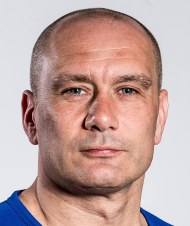 A Scottish mix of Wayne Gretzky and Gordie Howe produced Great Britain’s greatest hockey player. In the manner of Gretzky, Tony Hand recorded more than 200 points in a single British Hockey League season four times. And in the manner of Howe, Hand played in the BHL and its successors for 32 years!
A Scottish mix of Wayne Gretzky and Gordie Howe produced Great Britain’s greatest hockey player. In the manner of Gretzky, Tony Hand recorded more than 200 points in a single British Hockey League season four times. And in the manner of Howe, Hand played in the BHL and its successors for 32 years!
Starting with the Murrayfield Racers of the BHL in 1983 as a 14-year-old, Hand went on to play in the British ISL (Ice hockey Super League), the BNL (British National League), the EIHL (Elite Ice Hockey League), and, finally, the EPIHL (English Premier Ice Hockey League). By the time he retired in 2015, he was 47-years-old.
From 2001 to 2015, he was a player-coach, most notably with the Manchester Phoenix for whom he became full-time head coach in 2015 after finally retiring as a player.
Early in his career his play was so impressive that Edmonton Oilers’ general manager and coach Glen Sather, drafted Hand 252nd overall in 1986, the first British-trained player ever selected. Hand attended training camp two years running but was homesick and worried about being buried in the team’s junior system.
Internationally, Hand has the unique distinction of playing at the World Championship in A pool (1994, the last time Britain appeared at the top level), B pool / Division I (1993, 2000, 2001, 2002, 2007), C pool (1991, 1992), and D pool (1989, 1990). He also played in three U20 events (C pool) and in all played in 91 IIHF tournament games.
In 2004, Hand became the first ice hockey player ever honoured with the Member of the Order of the British Empire (MBE) by Queen Elizabeth II.
Paul Loicq Award
Patrick Francheterre
b. Lille, France, 19 November 1948
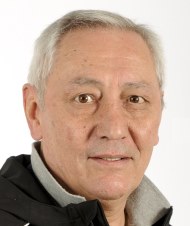
A career that started on ice, continued behind the bench, and endures to this day at the executive level, Patrick Francheterre has been involved in French hockey for the better part of half a century.
He started playing for Lille when he was 13 and joined Croix (its successor) in the pro ranks at the age of 18. At the end of his first season Francheterre played at his first World Championship, C Pool, in 1967. That fall, despite still being a teen, he was named player-coach for Croix, a position he held for the next 12 years.
Francheterre played in every World Championship for France between 1967 and 1977 (eight tournaments, all C Pool) as well as the 1968 Olympics on home ice, in Grenoble, the first time France had played in the Winter Games since 1936.
Even during his playing days, Francheterre turned to coaching. He started as an assistant in 1979 for the national U20 team, and two years later he was head coach of France’s U18 team.
In the fall of 1984, Francheterre became player-coach of the Bordeaux hockey club, and a year later he was named national team coach, a position he assumed for two seasons. In 1985, France won C Pool under his guidance, and a year later, in B Pool, the team finished fourth and has never played lower than that since.
It was only in 1988 that he retired permanently as a player.
Continuing to succeed at the executive level, Francheterre became team director for France in 1992 and three years later the assistant sports director. In 1999, he became club president of Bordeaux, a position he held for two years
It was in 2001 that he started his involvement at the IIHF level, becoming the chairman for European tournaments. He has also worked on the IIHF’s technical commission and served as the general manager for France’s hockey teams at the Olympics and World Championships, from 1993 to 1997 and again from 2004 to 2014.
Read full story here.
Center of Excellence Student Wins Two National Championships in Two Months
What defenseman Xan Gurney accomplished during the 2016-17 campaign was certainly one of the rarer feats seen in the youth hockey world.
The Grosse Ile native started the 2016-17 season skating for Compuware 16U. By the end of it, Gurney became a national champion in not one, but two leagues.
Gurney, a Total Package Hockey Center of Excellence student, brought home a USA Hockey national title with Compuware on April 10 in Pittsburgh after his squad took down Shattuck St. Mary’s.
A month later, Gurney helped the Chicago Steel capture the USHL’s Clark Cup in five games over the Sioux City Musketeers. The Steel captured the junior league’s title on May 23.
“It was an unbelievable ride with both teams really and it was just a great experience for both of them,” Gurney said. “It’s definitely been a year to remember.”
Gurney, a Western Michigan commit, was a late-season call up for the Steel, skating in one regular season game – in which he recorded an assist – and ten postseason games en route to the championship.
“It was an unbelievable experience winning it,” Gurney said of the Clark Cup run. “The guys here took me in and made me a part of the team. It was awesome seeing everyone come together.”
The TPH student-athlete credited his experience with the program helping him reach the next level of hockey.
“TPH really has helped me make the step up to the next level,” Gurney said. “It’s an unbelievable school that I believe is the reason I’ve had such a great year.”
Written by Stefan Kubus
Michigan Hockey Advancement Enjoys Successful Blaine Showcase
Total Package Hockey is pleased announce that the Michigan Hockey Advancement U16 and U18 programs finished a combined 8-0 in the midget division of the 2017 NAHL Showcase this past weekend in Blaine, MN. With their victories, the U18 team has improved their overall record to 5-0-1 and the U16’s moved to 4-2.
“While winning is certainly not the main goal of the MHA program, it is nice to see the players get rewarded,” TPH Director of Player Development and MHA U18 Head Coach Brandon Naurato said. “Michigan Hockey Advancement is about providing our players with a platform to be seen by the top junior and collegiate programs. That was the real win this past weekend.”
In addition to their perfect record, the U18 MHA squad led the entire event with a goal differential of +15. The U18’s were also the only team in their age group to finish a perfect 4-0 on the weekend. The U16’s were one of three teams in their division to finish 4-0, joining Honeybaked and the Oakland Jr. Grizzlies.
As Naurato mentioned, the goal of Michigan Hockey Advancement is just that- advancement. Perhaps the highlight of the weekend came when U18 defenseman Sam Brennan of Brighton High School committed to play Division I hockey at the Air Force Academy and dress for the NAHL’s Lone Star Brahmas in their Saturday morning game against the Philadelphia Rebels.
“We are proud of the steps the MHA program continues to take, and we were thrilled to be able to wear our colors at an event like the NAHL Showcase,” Naurato added. “We look forward to once again exposing our players to the Blaine experience next September.”
To learn more about Michigan Hockey Advancement, visit https://www.totalpackagehockey.com/mha-hockey-tph-detroit.
MHA 18U Team captures second-straight Bauer Motown Classic
Total Package Hockey is proud to announce that for the second straight season, our Michigan Hockey Advancement 18U Team has won the prestigious Bauer Motown Classic in Metro Detroit.
The MHA 18U squad secured the title in their respective division with a 4-2 victory over the Ted Reeve Thunder Sunday afternoon in Fraser.
The championship-game victory was the sixth of the tournament for the MHA team; they out-scored opponents 39-10 en route to a perfect 6-0 record.
On the season, the 18s are 15-1-1. The team now heads to Boston this week for the Beantown Fall Classic – the final event before the players depart for their respective high school hockey programs.
16U Team finishes second
While the 18U Team won their division, the 16U Team had an impressive showing, as well, finishing in second place.
The 16s finished with a 4-2 record after falling to Belle Tire 16U in the championship game.
Spending their weekend in Novi, the 16U Team recorded wins over the San Diego Gulls, the Cleveland Wildcats, the Cleveland Barons and Hill Academy.

